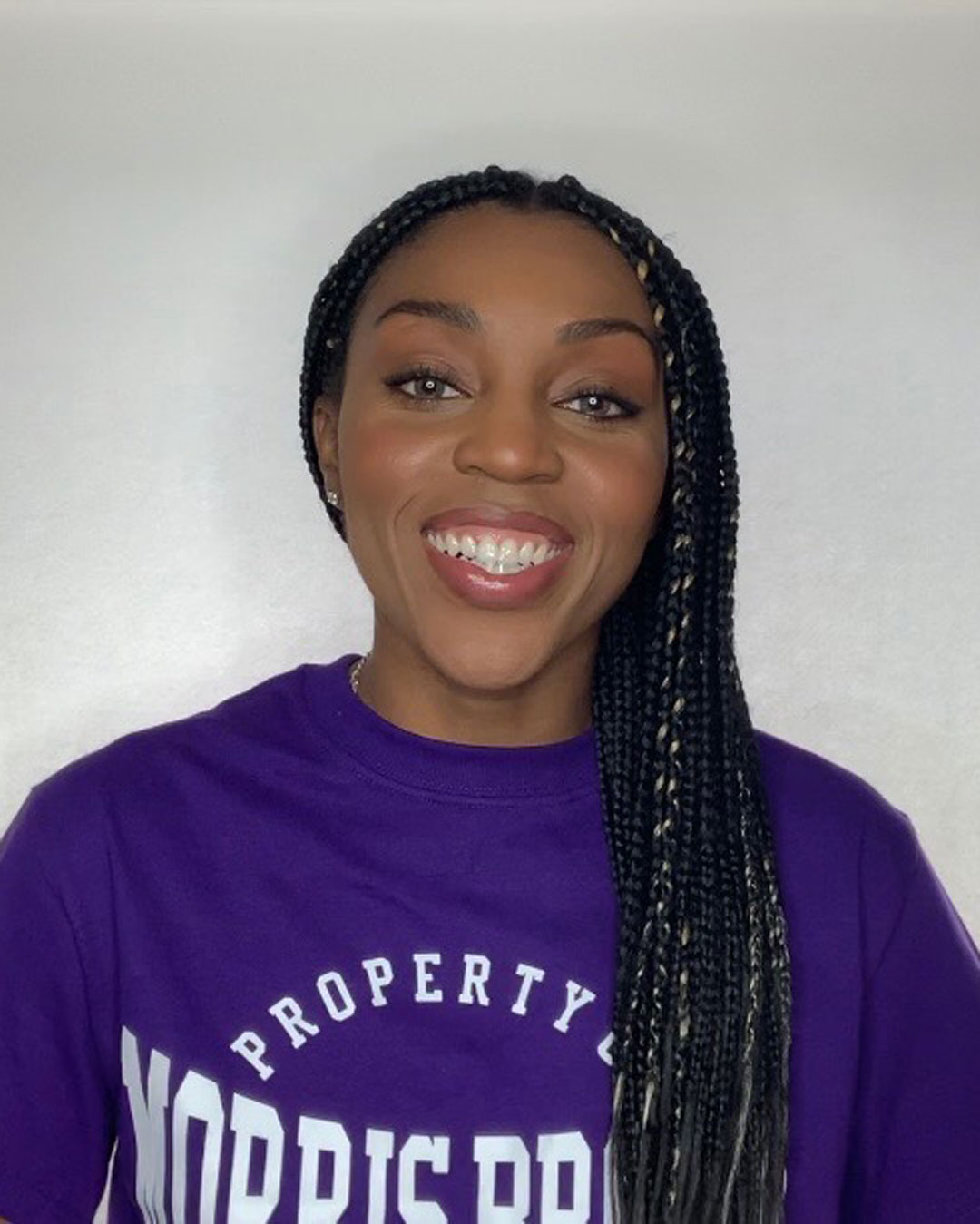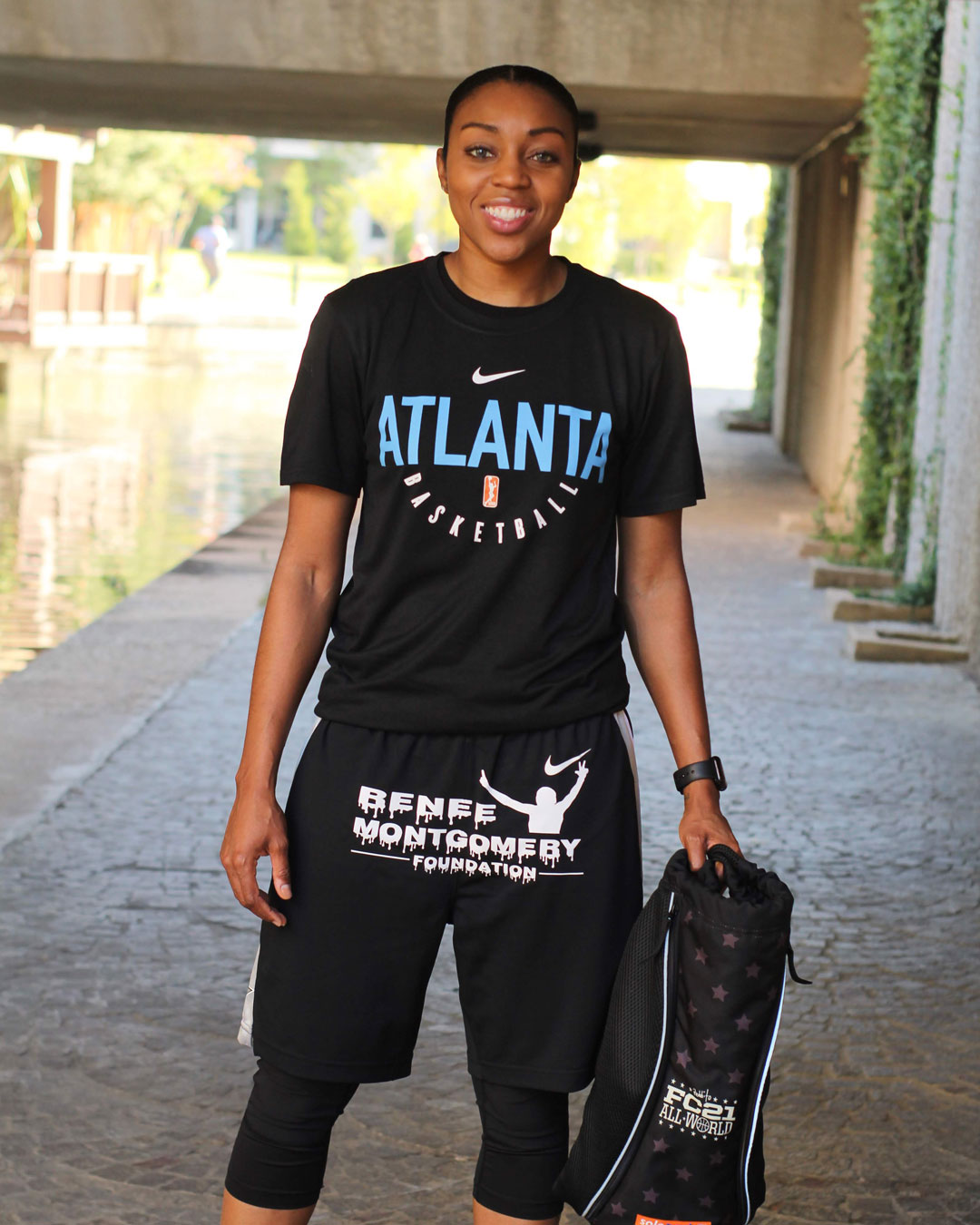Just a month before her Atlanta Dream teammates were set to return to the WNBA bubble in Florida, two-time WNBA champion Renee Montgomery was handing out water bottles in Atlanta. She stationed herself squarely at Centennial Park as a resource during a protest following the nearby death of Rayshard Brooks outside a Wendy’s.
Here Montgomery stood, offering dozens of Red Bulls and snacks to fuel participants. Her enthusiasm for activism was contagious, as she quickly spent the day talking to as many locals as possible. Few would have any idea that she has cemented herself as one of the most outspoken leaders in the League—on and off the court.
An NCAA championship at UConn and two WNBA championships in Minnesota have afforded Montgomery a platform bigger than the game itself. Montgomery’s easygoingness and exquisite communication skills have made her a staple on NBA TV, TMZ Sports, and as a spokesperson for the Remember The 3rd of November initiative. (All of Montgomery’s community efforts this year can be found in detail on her website. -Ed.)
But here in the moment, Montgomery is simply one with the vibrant Atlanta community, and has taken to discussing another topic she is quite passionate about in addition to basketball and voting rights: historically Black colleges and universities.
Back in June, Montgomery had already began her quest for what she calls her own “personal championship”—to help fundraise for Georgia’s oldest private HBCU, Morris Brown College.
Make no mistake, her focus on HBCUs was a highly intentional choice and, ultimately, would be the decision that sparked her interest in sitting out the 2020 WNBA season.
“I had a phone call with [Morris Brown] president Dr. Kevin James,” says Montgomery, “and he just started telling me way more than I knew—the history, how they lost their accreditation, and the steps they are already taking to get it back. And I was just like, This is it. This is what needs help.”
HBCU pride has a special place in the Montgomery home, as West Virginia State was the stomping ground for her parents’ first dates together, and her sister attended college there as well. In her Players’ Tribune article where she revealed her decision to opt out of the WNBA season, Montgomery wrote, “I grew up very heavy in the Black culture, just because of that. I grew up being very educated in that aspect.”
The irony of the matter is that, although she was raised by two HBCU alums, Montgomery repeatedly had to navigate all-white spaces as a child and adolescent. Montgomery was isolated as one of just a few young Black students in St. Albans, WV.
In the same Players’ Tribune piece, she wrote, “I used to dread Black History Month because I was the only Black kid in class. A young me was almost embarrassed. Not embarrassed to be Black—I was embarrassed to be the only Black kid when the whole topic was about me.”
While at UConn, Montgomery once again was a minority at a predominantly white institution. So when she got to Atlanta, she was invigorated by the depth of Black culture in the city. Montgomery is still enamored by the city she now calls home, especially with Mayor Keisha Bottoms, who she feels she can genuinely relate to. The intersection of Atlanta, Black culture and family ties to HBCUs are what made saving Morris Brown the perfect championship for Montgomery in 2020.

In early November, Morris Brown announced that their application for accreditation had been approved by the Transnational Association of Christian Colleges and Schools, and the institution will be considered for full accreditation in April 2021.
But Montgomery’s path raising money for Morris Brown continues. Getting Morris Brown on its feet requires not only accreditation, but significant financial backing to provide scholarships, staffing and adequate resources for all students.
Those curious as to why Montgomery didn’t pick another focus related to the systemic inequalities in our education system, or give to prominent Atlanta HBCUs such as Morehouse or Spellman, are likely not familiar with Morris Brown’s unique history. Morris Brown is a small co-ed institution and maintains a rather miraculous history.
“Morris Brown is the first and only historically Black college in the state of Georgia that actually was founded by Black people, former slaves,” James says. “That history in itself of not only founding your own institution but being able to fund your own institution, was a miracle in 1881.”
While Morehouse and Spellman are traditionally all-male and all-female HBCUs, both were also founded in part by white men or women. Morris Brown, on the other hand, has ties to the African Methodist Episcopal (AME) Church and was founded by a Black man in Wesley John Gaines.
In a time where it wasn’t uncommon for white missionaries to create schools for Black communities, Morris Brown was created by a Black man to uplift and promote future Black leaders.
“For that reason alone, you could argue that this college has to continue, that this college cannot close because of the blood, sweat, tears and sacrifices that these individuals made to start Morris Brown College,” James says.
James likely isn’t exaggerating about the blood, sweat and tears part. Morris Brown continues to fight for its accreditation and respect as a higher institution despite losing its accreditation in 2003 because of an embezzlement scandal implicating former president, Dolores Cross. Since then, the school’s enrollment has dwindled from 2,500 to 54 students.
What Morris Brown does have going for it is a tight-knit community atmosphere and a national interest. The college actually receives several thousand applications each academic year, but cannot accommodate students with financial barriers.
James and Montgomery have forged a friendship—surrounding the potential that sports can bring to Morris Brown—and that makes for the college’s best bet ever to get back on its feet. “Everyone loves a comeback story,” James says.
There are several aspects that make this potential Morris Brown comeback different the rest, and they all tie back to sports. What initially got Montgomery excited about Morris Brown was the prospect of the college’s new esports degree—the first of its kind in Georgia—which immediately would give the school a unique niche.
Morris Brown is considering starting their own esports team and partnering with their across-the-street neighbor in the Mercedes-Benz Stadium to host competitions. Atlanta is currently home to two esports teams in the Atlanta Reign of the Overwatch League and the Atlanta Hawks 2K affiliate in the Atlanta Talon. The Reign currently have over 70,000 followers on Twitter, and the city presents itself as a buzzing metropolis for future events.

And then the clear X-factor is Montgomery, of course. During a recent on-air segment for TMZ Sports, Montgomery wore a Morris Brown shirt. At minimum, several thousand viewers saw the name Morris Brown, and likely a few took their interest to the web to learn more. Media appearances outside, Montgomery is a fiery athlete-activist willing to put her time and resources to causes that matter to her.
“There’s this community growing right now, and it’s called athlete,” Montgomery says. “When I sat out, I’ve never received so much support from other leagues.”
Montgomery has already connected with the likes of Vince Carter while on his podcast series with The Ringer, and she describes him as being very receptive to her initiatives. Tampa Bay Buccaneers wide receiver Mike Evans also reached out to share support.
Montgomery knew Evans on a surface-level basis before deciding to sit out the WNBA season, but connecting over her HBCU initiatives forged a deeper connection. Next on her list to discuss her fundraising efforts: Falcons quarterback Matt Ryan. Even with all these connections in sports, the climb to save Morris Brown will be nothing short of treacherous.
“As an athlete, everyone’s asking you to give them money,” Montgomery says. “Why is [my cause] more important than others? I hope people see HBCUs the same way we say Black lives matter. HBCUs matter.”
The intersection between athletics and HBCUs hasn’t been fully tapped into, and that’s what Montgomery wants people to realize. There are only two current NBA players who attended HBCUs—Robert Covington and Kyle O’Quinn—who attended Tennessee State and Norfolk State, respectively.
Montgomery sees the potential of Maker Mob forming at Howard thanks to top recruit Makur Maker’s commitment. And she saw Chris Paul sporting HBCU gear every day while in the NBA bubble.
Sports can be the platform that propel HBCUs to the next level, and predominantly white institutions can finally play their part in making this happen.
“If you have these random one-off [non-conference] games, add an HBCU to your schedule,” Montgomery says. “That would mean the world to the HBCU, and it’s not that big of a hit to you.”
On January 18, we’ll finally see this potential shift into focus. Howard will play Notre Dame on Fox, and famed sportscaster and Howard alum, Gus Johnson will be in the booth. Howard’s student-athletes will appear on national TV. Howard as an institution will likely benefit from such a platform, and web searches and interest in the school may rise.
And by then, Renee Montgomery will be well on the way to her personal championship in Atlanta. Just you wait.
—
Ellie Lieberman is a contributor to SLAM. Follow her on Twiiter @ellieliebs.
Photos via Getty and Power The Photographer.